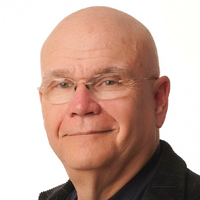There is nothing about winter that makes me want to dance, but "Winterdances" at UWM this week is something else. The dance department at the Peck School of the Arts annually presents "Winterdances" -- and "Summerdances" in June -- with faculty and guest artist choreography. Students in the department audition for roles and spend an entire semester rehearsing.
This winter's lineup includes works by two of the great choreographers of modern dance -- Mark Morris, whose "Canonic 3/4 Studies" is on the program, and the late Alwin Nikolais, who will be represented by his 1964 piece, "Water Studies." A seminal figure in contemporary dance, Nikolais is often called the godfather of the contortionist shapes of Pilobolus Dance Theatre and the acrobatic dance of Cirque du Soleil.
Nikolais died in 1993, and Alberto (Tito) del Saz, who danced in Nikolais' company for 14 years, keeps the torch alive as the official reconstructor of his work. He has been periodically flying in to Milwaukee the past two years to work with UWM students and reconstruct "Water Studies."
Ten of the 12 dancers in the piece also performed it under his tutelage in June of '09. They have continued to work on it and will stage it this week as they prepare to take "Water Studies" to a festival at Hunter College in New York in April. The event will celebrate the centennial of Nikolais' birth.
"Water Studies" requires dancers to become abstract shapes as part of the process of representing the different environments a body of water can create, del Saz said during a break in teaching here. In typical Nikolais fashion, the dancers disappear into fabric cocoons that become the equivalent of a painter's canvas.
The costumes are reflecting surfaces for a meticulously designed lighting scheme. Light is bent, shifted and becomes motion. The dancers are the manipulators.
"Nikolais is about motion, not emotion," del Saz said. "For a dancer, it is not how you feel. You become the dance.
"It is not about the dancer. The dancer is an instrument. The ego is secondary. This is not an emotive, look at me performance."
That doesn't mean "Water Studies" could be performed by programed robots.
"The shape of the movement is specific. How you get to that shape is individual. Individual personalities come through," del Saz continued.
The evocative light is the product of slides Nikolais hand painted -- with water color, smoke and scratches -- in 1964, and del Saz, who is co-director of the Nikolais/Louis Foundation for Dance, uses them for every "Water Studies" he reconstructs. Ten vintage projectors beam the light at the stage.
"The audience can't tell where the image is coming from," del Saz said. "It is a Nikolais trademark."
No attempt has been made to digitalize the precious slides. "A digital image doesn't have the same detail and intensity of color," he added.
Remarkably, Nikolais designed the costumes and composed the music for his choreography. Unlike most dance, the music does not stimulate the choreography. "It enhances it," del Saz said.
In addition to "Water Studies" and Morris' "Canonic 3/4 Studies," three premieres choreographed by Dani Kuepper, Elizabeth Johnson and Ed Burgess are part of this year's "Winterdances." Featured singers and musicians will include the UWM Concert Chorale, pianist Victoria Stepanova, and an original score written and played by David Wake and Seth Warren-Crow.
"Winterdances" will be presented Thursday through Sunday, Feb. 3-6, in the UWM Mainstage Theatre, 2400 E. Kenwood Blvd.
Damien has been around so long, he was at Summerfest the night George Carlin was arrested for speaking the seven dirty words you can't say on TV. He was also at the Uptown Theatre the night Bruce Springsteen's first Milwaukee concert was interrupted for three hours by a bomb scare. Damien was reviewing the concert for the Milwaukee Journal. He wrote for the Journal and Journal Sentinel for 37 years, the last 29 as theater critic.
During those years, Damien served two terms on the board of the American Theatre Critics Association, a term on the board of the association's foundation, and he studied the Latinization of American culture in a University of Southern California fellowship program. Damien also hosted his own arts radio program, "Milwaukee Presents with Damien Jaques," on WHAD for eight years.
Travel, books and, not surprisingly, theater top the list of Damien's interests. A news junkie, he is particularly plugged into politics and international affairs, but he also closely follows the Brewers, Packers and Marquette baskeball. Damien lives downtown, within easy walking distance of most of the theaters he attends.



